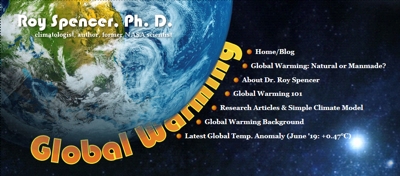Insights from the
NZ Climate Science Coalition
European heat wave June 2019
What climate emergency?
Articles in Business Insider since late June make outlandish claims about the European heat wave. Outlandish because they imply this was man-made global warming destroying the environment. It was nothing of the kind, just local weather systems producing temporary extreme temperatures.
They report it as ‘hellish’, ‘the hottest day in the history of France‘, the hottest June ever recorded in Earth’s history, and ‘temperature records haven’t just been broken. They have been obliterated.’
Bill McKibben tweets on it (glad he clarifies which earth he meant, as it’s not clear which one he’s on).
European satellite agency concludes that June was the hottest month ever recorded on earth, our planet. https://t.co/qesjAC5yHn
— Bill McKibben (@billmckibben) July 2, 2019
New York Rep. Alexandria Ocasio-Cortez retweeted McKibben’s message, adding, “Unless we act drastically now, it’s only going to get worse. What will that mean for our food, water, shelter, safety? We need a #GreenNewDeal. Now.”
Contradictory reports that would have kept the feet of a competent journalist on the ground are not hard to find. The following selection took me just a few minutes to locate. McKibben and AOC didn’t notice the event wasn’t global.
Dr Roy Spencer

Makes three points:
- Record High Temperatures Occur Even Without Global Warming.
- Summer Heat Waves are Weather-Related, and Unusual Cold is Usually Nearby.
- Most Thermometer Measurements Have Been Spuriously Warmed by the Urban Heat Island Effect.
NOAA
The National Climate Report stated that the average US temperature for May, the previous month, was 59.5°F, 0.7°F below average, ranking in the bottom third of the last 125 years (belying the notion of steady global warming). June warmed a little, to 68.7°F, 0.2°F above average, or in the middle third of the 125-year record. These facts discredit claims the warm period was unusually warm and caused by human emissions.
UK Met Office
Reviewing June, they gave no comfort to warmsters keen to show we’re wrecking the planet:
When reviewing temperatures, June 2019 was a remarkably average month. The mean temperature for the UK was only 0.2 °C above the long-term average. — emphasis added
Sydney – typical start to winter
It has been a fairly typical start to winter for Greater Sydney. Despite a few wet rain days during the months, rainfall was close to average for most locations. Daytime and overnight temperatures were also close to average.
New York – Weather: Record Cold Hits the City (This Is May?)
But we did set a record yesterday. Monday’s high temperature was just 48, making it the lowest high temperature of any May 13 since the city started keeping track. Before that, the record was 50, set in 1931.
There are others, but we get the picture.
Views: 103

https://www.researchgate.net/publication/334604643_Biological_criteria_and_shore_morphology_as_superior_evidence_of_sea_level_changes
Nor is the sea level rising, their agenda isn’t prevention of global warming, it’s control of mankind.
The sea level is rising in parts and falling in others. Around New Zealand, on average, it’s been rising at about 1.8 mm per year over the last 100 years. That’s 180 mm, or about 7 inches, per century. Where sea level around New Zealand is falling, it’s because the land is being pushed up by fairly regular earthquakes: tectonic movement. In the recent Kaikoura earthquake, parts of the coast were uplifted over 7 metres while other parts subsided more than 3 metres.